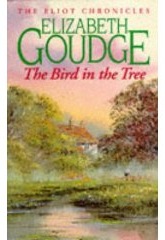Author: Elizabeth Goudge (1900-1984)
 About the Books
About the Books
This is a trilogy set in England spanning from after WWI to after WWII. The titles of the books, in order, are
The Bird in the Tree, published in 1940
The Herb of Grace (entitled Pilgrim’s Inn by American publishers), written in 1948
The Heart of the Family, written in 1953.
About the Author
A quick look at Wikipedia also reveals this about Elizabeth Goudge’s writings: Her favorite among her books was The Little White Horse (1946), which is also a favorite of J. K. Rowling, author of the Harry Potter stories.
Another little tidbit that’s significant for me: She also wrote a book called Island Magic (1934), which is about the Channel Islands. It seems her mother was a native of Guernsey. Two of my favorite experiences have been watching The Island at War, a BBC series, and reading The Guernsey Literary and Potato Peel Society. (Can you tell I’m a fan of British historical fiction?)
Not for Everyone
I would recommend The Eliot Family series to certain readers, but not all. They have what I think you’d call an esoteric appeal.
Because the place is as important as the characters, Goudge describes it in great detail. She does it well. Even if you don’t recognize the names of all the flora and fauna she describes, you still get a sense of the lush surroundings, the smallest leaf, every sparkle of the sun.
Since the books were written in the early 20th century, some may find the language old-fashioned, which to me is part of its appeal.
Goudge also develops the characters wonderfully. This is a quote from a friend who is still reading the second book in the series:
I’m really in love with the Eliot family, and will continue to read the books in the series. I love how the author writes her books.
The Spiritual Dimension
My sister, who recommended the book to me, commented that in this series, Goudge makes you feel like everything’s going to be all right.
The two houses in the books, Damerosehay and the Herb of Grace, bring out the best in all who enter them, helping them shed both their sins and their struggles. The source of the spirit of the houses is Lucilla, the matriarch. The books richly emphasize a spirituality that comes from God and the value of children as our legacy. The last word of the last book is “child.”
Sunset or sunrise, he had forgotten now which it was. The old house seemed to hold them both, and to hold, too, a welling up of freshness, as though it renewed its youth in the youth of this marvellous child.

Love this post, of course. Good reading for Christmas morning, with a house filled with 11 members of our family. Inexpressibly joyful feelings. Love these books.
Thanks for introducing me to the Eliot family, Yvonne. I’m thinking a lot about family dynamics these days — the influence of parents, the future that’s ahead for our children and grandchildren, themes that are a large part of the Eliot Chronicles. Thanks for the comment.
Pingback: Book Clubs: How Reading Becomes a Social Event | Aging in Wonder